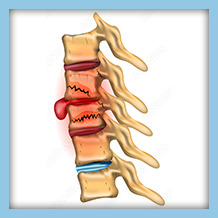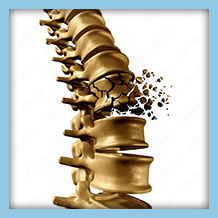

These types of fractures usually have a sudden onset with little warning. You might feel intense pain in your back after sitting for a while or get hit from the side while playing sports and experience sharp pains afterward. If you experience any sudden pain in your spine, see a doctor immediately and avoid putting continuous strain on your back until you get better.
What is a Spinal Compression Fracture?
A spinal compression fracture is a type of fracture that occurs in the vertebrae of the spine. These fractures can be caused by trauma, such as a fall, or by degenerative conditions, such as osteoporosis. Spinal compression fractures can lead to back pain and a loss of height. In some cases, the bones may collapse into an abnormal position, known as kyphosis. Treatment for a spinal compression fracture may include wearing a back brace, taking medication, or having surgery.
Compression Fracture Prevention
You can do several things to help prevent a compression fracture, especially if you are at risk for osteoporosis. First, get a bone density test to check your overall health. If you have osteoporosis, treatments are available to help improve your bone density. It would help if you also focused on overall health by eating a balanced diet and exercising regularly. This will help prevent compression fractures by improving bone density and preventing falls.
Symptoms of a Compression Fracture
A compression fracture of the spine can cause back pain and a hunched-over posture. An X-ray is usually needed to diagnose a compression fracture. A compression fracture occurs when a bone in the spine is compressed or squeezed. This can happen because of osteoporosis, cancer, or other reasons. In some cases, there are no symptoms. But if symptoms do occur, they may include:
- Back pain that gets worse when you stand or sit up straight
- A hunched-over posture
A compression fracture can often be seen on an X-ray for other reasons, such as a separate injury after a car accident or other trauma.
Compression Fracture Diagnosis
A compression fracture is diagnosed by taking an X-ray of the spine. A compression fracture can be seen on an X-ray as a vertebra collapse. A CT scan or MRI may also be done to look for other fractures or problems in the spine.
Bone density testing may be done to see if osteoporosis can make bones more likely to break. Dual-energy x-ray absorptiometry (DXA) is a type of X-ray that can measure bone density.
Compression Fracture Treatment
A compression fracture is treated by injecting cement into the vertebra to stabilize it. This is done in a procedure called vertebroplasty. A back brace can help prevent further damage to the spine and provide pain relief. In some cases, surgery may also be necessary to correct the problem.
Pain relief is also essential in treatment, as compression fractures can cause significant back pain. To avoid putting additional strain on your back, it is vital to maintain good posture and strengthen your core. You can also try heat therapy or acupuncture to reduce pain and relax tense muscles.
Possible Complications of a Compression Fracture
A compression fracture occurs when the vertebrae collapse due to pressure. This can lead to a kyphosis deform, which can cause severe pain. The spinal cord may be compressed in severe cases, leading to even more severe pain and paralysis.
Spinal compression fractures are sometimes seen in people who have osteoporosis. The bones become weak and porous in this condition so they can break more easily. These types of fractures usually occur in older adults at risk for osteoporosis. In rare cases, spinal compression fractures can be fatal or lead to paralysis or even death for seniors with other co-morbid medical conditions.
Schedule an Appointment With a Spine Doctor
A compression fracture is a type of fracture that occurs in the vertebrae of the spine. These fractures can be caused by trauma or by degenerative conditions such as osteoporosis. Compression fractures are painful condition that affects many people. Several treatments are available to deal with the pain and prevent further damage to your spine. A compression fracture should not be ignored and requires professional care. See a doctor immediately if you have experienced back pain, tingling, or numbness in your legs, arms or feet. A compression fracture can be debilitating and require surgery to correct. Contact Orthopedic Laser Spine Surgery at (855) 853-6542 or fill out our online form to schedule an appointment.
